- Home
- P. L. Gaus
A Prayer for the Night
A Prayer for the Night Read online
Table of Contents
A PLUME BOOK
Title Page
Dedication
Copyright Page
PREFACE AND ACKNOWLEDGMENTS
Epigraph
FRIDAY, JULY 23
Chapter 1
Chapter 2
Chapter 3
Chapter 4
Chapter 5
Chapter 6
Chapter 7
Chapter 8
Chapter 9
Chapter 10
Chapter 11
Chapter 12
Chapter 13
Chapter 14
Chapter 15
Chapter 16
Chapter 17
SATURDAY, JULY 24
Chapter 18
Chapter 19
Chapter 20
Chapter 21
SUNDAY, JULY 25
Chapter 22
Chapter 23
Chapter 24
Chapter 25
Chapter 26
WEDNESDAY, JULY 28
Chapter 27
FRIDAY, JULY 30
Chapter 28
MONDAY, AUGUST 2
Chapter 29
Chapter 30
THURSDAY, AUGUST 12
Chapter 31
FRIDAY, AUGUST 13
Chapter 32
Teaser chapter
A PLUME BOOK
A PRAYER FOR THE NIGHT
PAUL LOUIS GAUS lives with his wife, Madonna, in Wooster, Ohio, just a few miles north of Holmes County, where the world’s largest and most varied settlement of Amish and Mennonite people is found. His knowledge of the culture of the “Plain People” stems from more than thirty years of extensive exploration of the narrow blacktop roads and lesser gravel lanes of this pastoral community, which includes several dozen sects of Anabaptists living closely among the so-called English or Yankee non-Amish people of the county. Paul lectures widely about the Amish people he has met and about the lifestyles, culture, and religion of this remarkable community of Christian pacifists. He can be found online at: www.plgaus.com. He also maintains a Web presence with Mystery Writers of America: www.mysterywriters.org.
For the women—Madonna, Laura, and Amy
PLUME
Published by the Penguin Group
Penguin Group (USA) Inc., 375 Hudson Street, New York, New York 10014, U.S.A. Penguin Group (Canada), 90 Eglinton Avenue East, Suite 700, Toronto, Ontario, Canada M4P 2Y3 (a division of Pearson Penguin Canada Inc.) * Penguin Books Ltd., 80 Strand, London WC2R 0RL, England * Penguin Ireland, 25 St. Stephen’s Green, Dublin 2, Ireland (a division of Penguin Books Ltd.) * Penguin Group (Australia), 250 Camberwell Road, Camberwell, Victoria 3124, Australia (a division of Pearson Australia Group Pty. Ltd.) * Penguin Books India Pvt. Ltd., 11 Community Centre, Panchsheel Park, New Delhi – 110 017, India * Penguin Group (NZ), 67 Apollo Drive, Rosedale, North Shore 0632, New Zealand (a division of Pearson New Zealand Ltd.) * Penguin Books (South Africa) (Pty.) Ltd., 24 Sturdee Avenue, Rosebank, Johannesburg 2196, South Africa
Penguin Books Ltd., Registered Offices: 80 Strand, London WC2R 0RL, England
Published by Plume, a member of Penguin Group (USA) Inc.
First Plume Printing, February 2011
Copyright © P. L. Gaus, 2006
Excerpt from Separate from the World, copyright © P. L. Gaus, 2008
All rights reserved
REGISTERED TRADEMARK—MARCA REGISTRADA
The Library of Congress has catalogued the Ohio University Press edition as follows: Gaus, Paul L.
A prayer for the night : an Ohio Amish mystery / P.L. Gaus. p. cm.
eISBN : 978-1-101-48621-4
1. Amish Country (Ohio)—Fiction. 2. Amish youth—Crimes against—Fiction. 3. Branden, Michael (Fictitious character)—Fiction. 4. College teachers—Fiction. 5. Amish—Fiction. I. Title
PS3557.A9517 P73 2006
813’.54—dc22
2005036053
Without limiting the rights under copyright reserved above, no part of this publication may be reproduced, stored in or introduced into a retrieval system, or transmitted, in any form, or by any means (electronic, mechanical, photocopying, recording, or otherwise), without the prior written permission of both the copyright owner and the above publisher of this book.
PUBLISHER’S NOTE
This is a work of fiction. Names, characters, places, and incidents are either the product of the author’s imagination or are used fictitiously, and any resemblance to actual persons, living or dead, business establishments, events, or locales is entirely coincidental.
The scanning, uploading, and distribution of this book via the Internet or via any other means without the permission of the publisher is illegal and punishable by law. Please purchase only authorized electronic editions, and do not participate in or encourage electronic piracy of copyrighted materials. Your support of the author’s rights is appreciated.
BOOKS ARE AVAILABLE AT QUANTITY DISCOUNTS WHEN USED TO PROMOTE PRODUCTS OR SERVICES. FOR INFORMATION PLEASE WRITE TO PREMIUM MARKETING DIVISION, PENGUIN GROUP (USA) INC., 375 HUDSON STREET, NEW YORK, NEW YORK 10014.
http://us.penguingroup.com
PREFACE AND ACKNOWLEDGMENTS
All of the characters in this novel are purely fictional, and any apparent resemblance to people living or dead is entirely coincidental. The Holmes County setting for this story is authentic, but Millersburg College is fictional. The GPS coordinates for Gypsy Springs School are accurate. The practice of Rumschpringe is authentic, though rarely carried to the extremes depicted here.
In the vicinity of Saltillo, straddling Township Lane 129, there is a tree farm owned by Dick and Carol Potts. In the area, there are also two abandoned mines where Amish still chip out blocks of coal. Also, there are several old cabins used formerly by the city of Mansfield for summer camps for underprivileged and at-risk children. Near a spot that used to be marked by an old tree with an elbow-shaped trunk, there is a cave entrance that leads to a larger cavern, with a second opening to light, some hundred yards uphill from the bottom. The story is told that a log cabin was built over the upper portal of the cave, and that settlers could escape into the old cave when attacked by Indians.
The wedding ceremony depicted here has been adapted from the translation of an authentic ceremony provided by the late William I. Schreiber in his important book Our Amish Neighbors, which is still available from his estate through the Florence O. Wilson bookstore on the campus of the College of Wooster, in Wooster, Ohio.
Then we will no longer be infants, tossed back and forth by the waves, and blown here and there by every wind of teaching and by the cunning and craftiness of men in their deceitful scheming.
Ephesians 4:14
FRIDAY, JULY 23
1
Friday, July 23
7:45 A.M.
SARA YODER drove her black buggy in bright sun up to the high ridgelin e at Saltillo and stopped the Standardbred horse on the blacktop at the intersection of county roads 407 and 68, southeast of Millersburg. It had been two and a half years since she had entered her wild period, her Rumschpringe, quitting school on her sixteenth birthday. Just a week ago she had crossed this ridge in a red Firebird, heading north for the weekend out of her little Amish valley along Township 110 to the bars in Wooster. Dressed English and running wild. Freed from the everyday constraints of Old Order Amish life by the Rumschpringe.
Her horse was lathered from the climb out of the valley, so she popped her whip in the air and pulled forward into the shade of an oak, thinking that Bishop Raber just might have been right all along. The preachers, too. Life out there with the English was dangerous. The winds of temptation were too strong for anyone. But hadn’t the Old Order allowed it? Ha
dn’t she been set free by tradition, to get the wildness out of her system, to see all of the English world she could handle, knowing that soon, at this reckoning point in her life, she’d be asked to make a decision? To turn from the world and come home to a lifetime of Amish obedience? To know full well what was out there among the English and freely decide to turn from that sinfulness and join the Old Order?
But Sara Yoder also knew too much now of what the English had to offer. She knew firsthand what life could be like out there in the world. What the real differences between an Amish and an English life were. And it surprised her that she wasn’t at all sure that the English were right. Perhaps it really was all vanity and pride, as her parents had assured her.
Truth be told, Sara wasn’t sure about even the small things anymore, much less about the consecrated life her parents expected her to lead. Marry at eighteen, join the Old Order congregation, raise a dozen children, and submerge her identify in conformity. Surrender who she was for the sake of humility. To be the same, act the same, live the same as everyone else. To live only for the community of believers. No longer to be an individual. No longer to be just Sara.
In the English world, Sara Yoder was beginning to like the separate person she was becoming. She liked the choice of clothes, the modern conveniences, the pace and feel of freedom. She liked the vision she had of Sara Yoder separate from everyone else, a unique and distinct personality. Free to act and do as she felt. Free to move, breathe, live in the open. Free to be herself.
In the end, though, the scrap of newsprint she held on her lap gave the lie to all that English freedom. It called her to face the truth about the dangers that were out there in the world. It reminded her that John Schlabaugh and Abe Yoder no longer answered their cell phones or returned text messages. Just when John had promised them all the means to free themselves from the vise grips of backward Amish traditions, he had disappeared. Andy Yoder, too. There wasn’t going to be any great emancipation for the John Schlabaugh Rumschpringe gang of Saltillo. There weren’t going to be any easy answers. No easy escapes.
Sara cast her eyes to the newspaper clipping and read the cryptic lines in the correspondence section of the Budget. Four lines of numbers, demanding attention from the handful of readers who could decipher them, inserted among the scores of family letters from Amish all over the world. The Sugarcreek Budget, published each Wednesday, and mailed to anyone, anywhere, who might be interested to know what had happened recently in the lives of the Helmuths in Kansas, or the Peacheys in Ontario. Troyers, Millers, or Yoders. Who had been born, and who had died, in Texas. The quality of the wheat harvest in Mexico that year. Family news from around the world, in an Amish paper published for Amish readers everywhere.
But Sara was concerned only with the four lines of type that were meant, ominously, for her. A greeting number. A location—latitude and longitude. And a closing number:
3
N 40° 31.174’
W 81° 53.890’
2
Only she and eight others would know what it meant. Anyone in the John Schlabaugh Rumschpringe gang that year. This was their meeting place. This was where they gathered, out of sight of their families, for their running-wild trips to town, once their chores were finished. Once the weekend had come, and they had changed into English clothes. Their parents discreetly looking aside. Pretending not to worry.
Sara folded the paper, set it beside her on the leather seat, and snapped her whip lightly over the withers of her horse. She worked the buggy slowly past the traffic triangle at the top of the ridge and dropped down through the cool shade of the tree farm on the gravel lane of Township 129. At the bottom of the hill, she turned south on County Road 58, crossed Lower Sand Run, and turned eventually onto a narrow, pebbled drive that took her through a stand of pines, around a curve, and up to a small clearing. Near a pond at the edge of a cornfield stood a small red barn. As she pulled to a stop in front of the barn doors, a raccoon with dirty paws scrambled out from under the exterior wall of the barn and scurried off into the corn.
She hitched her horse to a wooden railing that John Schlabaugh had posted in the ground beside the barn, and a rusted, blue Buick Skyhawk rolled into the clearing. As she tugged the looped reins tight on the railing, Henry Erb climbed out of the little sedan. He was dressed in English clothes—designer jeans, a yellow golf shirt, and white running shoes—but his Dutch-boy haircut gave him away as Amish.
Henry said, “You saw the Budget, too?”
Sara nodded and asked, “Have you seen John or Abe?”
“No,” said Erb, and glanced around expectantly. “Anybody else been here?”
He saw that the lock on the barn doors was hanging loose, and he came around the front of his car to open the doors.
Sara joined him and said, “I should have come out here yesterday.”
“It was just coordinates in the newspaper,” Henry said. “What are we supposed to do with that?”
Sara said, “I wouldn’t think anything of it if John and Abe weren’t missing.”
“I tried their cells again this morning,” Henry said. “Still nothing.”
Sara took the left side and Henry the right, and they swung the heavy wooden doors open. There was a damp and musty odor as they entered the gloom of the barn. Henry reached up to a kerosene lantern hanging on the inside wall, lit the wick, and carried the sooty lamp into the barn. At the far edge of the light, an old, red Pontiac Firebird sat with its stern backed up against the far wall.
Sara followed Henry to the car. He held aloft the light to shine it into the front seat. Sara peered into the passenger-side window, touched the vinyl seat, and brushed off a crusty rust-red residue. She showed her fingers to Erb. “John and Abe must have had another fight,” she said. “Right? It doesn’t mean anything more.”
Erb shrugged with a grimace, and walked around to the driver’s side. He opened the door, looked in, and said, “Keys are missing.”
Sara said, “Did you ever know John to park his car here?”
Erb frowned. “No. He keeps it out at his trailer. With mine and Jeremiah’s.” With a clipped, stuttering cadence, Erb added, “John would never leave his car. If he’s parked it here, then something’s wrong.”
“It’s gotta be the drugs,” Sara said ruefully, backing away from the Pontiac. “They’ve gotten themselves in too far.” She looked furtively around the barn, anxiety showing on her face.
“John’s too smart for that,” Erb said, closing the car door.
“I’m not so sure,” Sara countered. She turned from the car and saw something in the near corner. “Bring the light over here,” Sara said, kneeling on the dirt floor of the barn. When Erb brought the light, they could see a ragged hole scratched in the dirt.
“I scared off a raccoon when I drove up,” said Sara. The edge of a plastic bag showed in the hole. Sara scooped dirt out from around the bag and pulled it loose.
Inside the bag were a black leather wallet, two car keys on an antique Pontiac fob, a GPS receiver in a plastic camouflage case, and a cell phone. Erb said, “Those are John’s keys. For the Firebird.”
Sara took out the wallet and thumbed it open. “This is John’s wallet, too.” She pulled out the GPS receiver and asked with growing dread, “Is this John’s GPS unit?”
“Can’t tell,” Erb said. “John’s is like all of ours. I guess it’s his.”
Puzzled, Sara said, “This is not John Schlabaugh’s phone.”
“Right,” Erb said, “but whose?”
Sara frowned, shook her head, and dropped the items back into the plastic bag.
Erb stepped back toward the doors of the barn and said, “Look, Sara. I don’t like it here. John’s got some kind of funny business going on, and I don’t think we ought to be messing in with it.”
Sara asked, “Who put those coordinates in the Budget, Henry?”
“I don’t know.” Backing out the door.
“You need to stay and help me figure this
out,” Sara insisted.
“I was going up to Wooster. You ought to come along,” Erb said sheepishly. He reached his car, got in quickly, cranked the engine to life, and spun around in the dirt to point his Buick back down the lane. With his left arm hanging out the window, he said, “Look, Sara. This is John’s business. He calls the shots. So I’m not getting involved.”
Sara shook her head, not bothering to hide her mounting consternation. “There’s something wrong here, Henry. And none of us is innocent anymore. We need to face this.”
“I can’t get mixed up in any more of John’s schemes. The bishop has been to see my father already.”
Sara took her cell phone out of the front pocket of her apron and said, “I know someone who can help.”
“I can’t stay,” Erb said, his voice strained. “I’m going up to Wooster tonight. If you want to go, come down to the schoolhouse. I’m going to get the others to come along.”
Sara gave a dissatisfied shake of her head and waved Erb off. She stood in front of the barn doors, punching in the phone number, and watched Henry Erb speed down the lane toward County 58 and disappear into the overhanging pines.
While she waited for the call to go through, Sara held the plastic bag up to her eyes and studied the contents with growing apprehension. The call went dead. She lowered the phone from her ear and saw a “No Signal” indication on the display. She untied the reins, got back into her buggy, trotted her horse up to the higher ground at Saltillo, and tried the call again. With better reception on the ridge, she got Pastor Cal Troyer at his church in Millersburg. She explained where she was and asked him to come out to meet her at the barn. When he asked what her problem was, she gave an evasive answer.

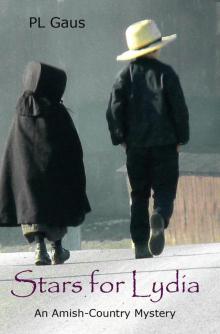 Stars for Lydia
Stars for Lydia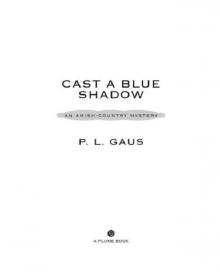 Cast a Blue Shadow
Cast a Blue Shadow Separate from the World
Separate from the World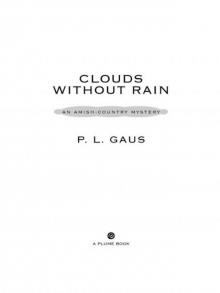 Clouds without Rain
Clouds without Rain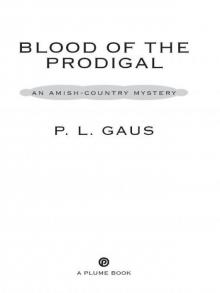 Blood of the Prodigal
Blood of the Prodigal Whiskers of the Lion
Whiskers of the Lion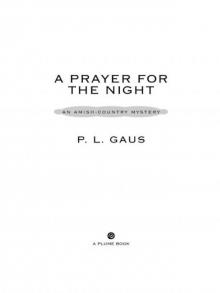 A Prayer for the Night
A Prayer for the Night Broken English
Broken English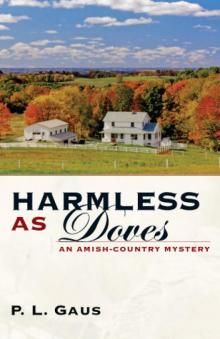 Harmless as Doves: An Amish-Country Mystery
Harmless as Doves: An Amish-Country Mystery